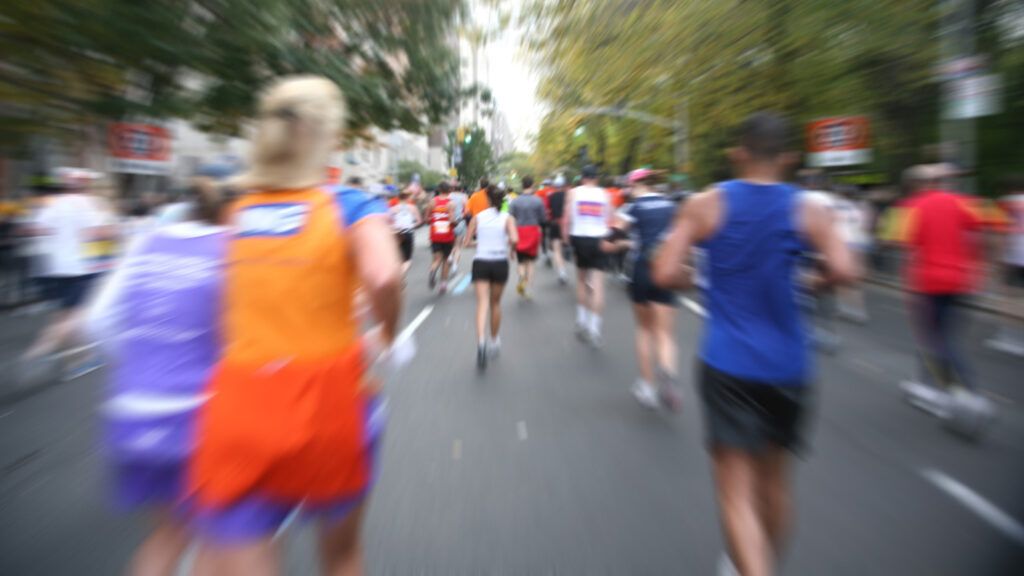In the spring of 1982 I was 25 years old, with a newly acquired master’s degree in social work, and sharing a New York City apartment with my twin sister, Laura. Times being what they were, I was out of work. And I was 25 pounds overweight. So, when I wasn’t out looking for a job, I busied myself doing sit-ups in an effort to lose weight. And, because I needed spiritual strength as well, I began reading the Bible.
And then the strangest thing happened. One day I was sitting on the living room floor doing sit-ups, huffing and puffing like a steam engine, when a singular thought drifted through my mind…a thought so unusual it couldn’t have been my own…a thought that grabbed my attention and held it like one of those messages being pulled across the sky by an old-time biplane: Run the New York City Marathon.
The thought at first excited me, but it was so ludicrous that I laughed out loud. You see, my sister and I were both born with cerebral palsy. We have what is called mild spastic partial paralysis of our legs, and to get around, we depend on our “Canadian canes,” aluminum crutches that attach to our forearms.
As the days passed, however, the thought wouldn’t leave me. I kept wondering: Was it possible?
When I told Laura about the thought, she didn’t seem to think the idea was so ridiculous. “I don’t know about any marathon,” she said in her quiet, matter-of-fact way, “but you do have a lot of time on your hands. And you do want to get in shape. Maybe you could try jogging.”
That did it. Running the marathon was an impossible goal, a goal that would take a miracle to accomplish, but that appealed to me. The New York City Marathon was six months away. I would do everything I could to run it.
Back then the only way to run in the New York City Marathon, if you weren’t a nationally recognized runner with a preexisting qualifying time, was to apply early or enter a lottery. I’d already missed the early filing deadline, so I had to go into the lottery. When I filled out the application form, there was no box to check for “disabled.” I simply completed the form like an able-bodied person and dropped it in the mailbox with a prayer.
I didn’t tell many people about my plans, just Laura, my mom and a few close friends. I was too shy—embarrassed, really—to talk about it. What if I failed? Could I finish even part of the 26-mile, 385-yard race?
When I started training, my pace was so slow, about 25 minutes per mile, that I found myself doing a lot of running at night. About three times a week, often after a long day of job hunting, I grabbed my crutches and set out from our apartment on East 39th Street. I headed north, up Fifth Avenue—past Trump Tower and Tiffany’s, past the Plaza Hotel, and up alongside Central Park, where uniformed doormen stood guard in front of the city’s most elegant apartment buildings. As weeks passed, I became a familiar sight, hurrying by on my crutches; doormen tipped their hats as I passed and some called out words of encouragement.
As I grew stronger, my runs grew longer, taking me farther up Fifth Avenue, past the Metropolitan Museum of Art, and all the way up to Mount Sinai Medical Center on 100th Street, where I turned around and headed back home the same way. Many times it was past midnight when I finally returned home, where Laura would be waiting up for me with my favorite dish, a big plate of spaghetti.
In the weeks that followed, I found there was something about running at night that invited a contemplative mood. The city around me faded away; I talked to God and listened for his response. As I planted both rubber tips of my crutches on the pavement ahead, leaned into the darkness and pulled my unwilling legs toward the seemingly impossible goal of 3 miles…9 miles…12 miles…16 miles…it occurred to me that running in the dark was a lot like faith. “Faith,” it says in the Bible, “is the assurance of things hoped for, the conviction of things not seen.”
Not that faith was darkness. The darkness was the myopia of my limited human vision, the shortsightedness of my dreams, my inability to see beyond difficult circumstances, whether unemployment, unwanted pounds or a physical disability. But faith was the running—running with conviction, full-steam ahead—into the darkness. Faith was running in the dark with the assurance that God, who held my destination in his hand, would see me through the journey safely. All he asked of me was to trust him. And to keep on running.
Incredibly, at the end of the summer I received a notice in the mail informing me that I had been selected in the lottery and was among the 16,000 who entered the marathon. I was going to run!
On Sunday morning, October 24, I stood at the base of the Verrazano-Narrows Bridge on Staten Island, the starting point of the race. I wore leather gloves to prevent my palms from getting blisters from the friction of the crutches, and I carried a small canteen of water and a pocketful of vanilla fudge caramels for extra energy. My family and some friends agreed to meet me at the marathon’s 15-mile mark—if I made it that far.
Grouped among the slower runners at the rear of the crowd, I didn’t even hear the starting gun. And suddenly I was caught in the throng of runners moving across the mile-long bridge leading to Brooklyn. No one had told me the bridge was uphill, and the early morning wind was cold and hard. When I came off the bridge, I was already tired. And totally alone. The other runners were out of sight.
Most of the crowd of spectators had gone too, and city workers were beginning to disassemble the police barricades. Ahead, down the middle of the street as far as I could see, stretched the thin blue line painted to mark the marathon route—a route that promised to take runners through all five of New York City’s boroughs, ending at the finish line in Central Park.
I’ve always loved the energy and vitality of Manhattan—but now, for the first time, I found myself running through New York neighborhoods I’d only read about. It’s often said that New Yorkers are a hard, tough breed who don’t care about other people. But the New Yorkers I encountered that day were a big-hearted lot whose support and encouragement brought tears to my eyes.
There was the pretty little blonde girl in Brooklyn who pulled away from her parents and ran out in the middle of the street to say, “You can do it!” And there was the group standing on the sidewalk outside a tavern in Queens who applauded and cheered and shouted, “Keep going!”
Because I was so slow, by the time I reached official water stations they had been dismantled. In the more dangerous neighborhoods, people offered to walk with me as I ran, taking my canteen and refilling it with water.
But as the afternoon wore on, I began to worry. The streets had all been reopened to traffic, and I was running alone on the sidewalk. What would I do when it got dark, and I could no longer see the blue line? I had a terrible sense of direction…who knows where I might wind up?
And then, at mile 10, a small miracle happened. An ABC camera crew showed up out of nowhere and asked if they could accompany me. Thanks to their presence I no longer had to worry about getting lost.
At mile 13, Laura, Mom and two friends came looking for me in a car. “I’m okay,” I reassured them.
At the 20-mile point, exhaustion began to set in. My hands ached, and my forearms, which I hadn’t thought to protect, were black and blue and swollen. I’d worn a hole in one of my sneakers. The pain and fatigue got so bad that I couldn’t talk, but I kept praying: I can do all things…I can do all things…
By the time we reached Central Park, I’d been running for more than 10 hours. Two more miles and it would all be over. The park was dark and empty. At regular intervals, old-fashioned streetlamps cast a ghostly glow on my path.
Suddenly, two Parks and Recreation trucks appeared—one behind me and one in front of me—sending their spotlights into the darkness to light my way.
Up ahead, the finish line was being dismantled. But the official time clock was still running: 11:00:57. Finished!
Someone was putting me in a wheelchair and wrapping a paper-thin, silvery Mylar sheet around me. People were crying—even the ABC camera crew—and I began to cry too. Thank you, Lord, was all I could think. Thank you. Without you, this never could have happened.
The next morning I was shocked to learn I’d been invited to join Alberto Salazar and Grete Waitz, the winners of that year’s marathon, at the White House to be congratulated by President Reagan. It turned out that I was the first woman ever to finish the marathon on crutches.
An unexpected crush of publicity followed; my picture was on the front page of the New York Times, and it seemed the phone would never stop ringing with requests for interviews. Over and over again, I heard myself described as “Linda Down, brave athlete.”
Brave? Athlete? Those terms seemed so outlandish to me. And yet, the fact of the matter was that, even with a disabled body, I was able to do something far beyond anything I had ever imagined because I trusted God and took him at his word.




